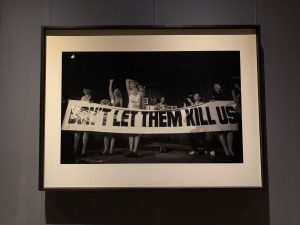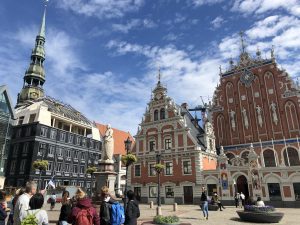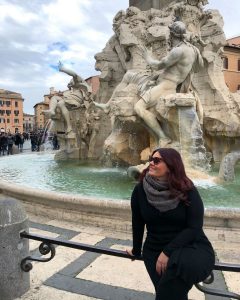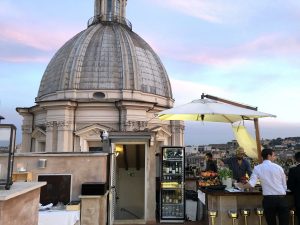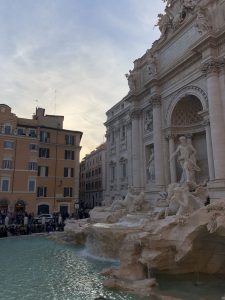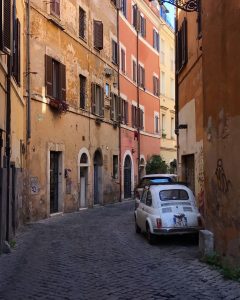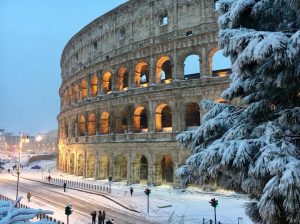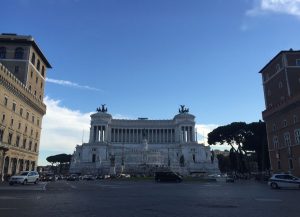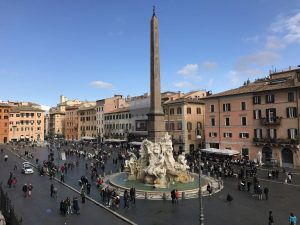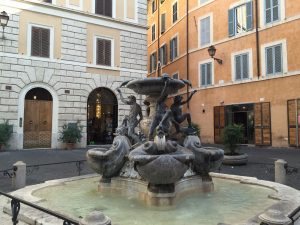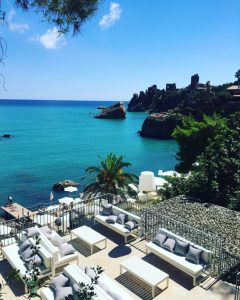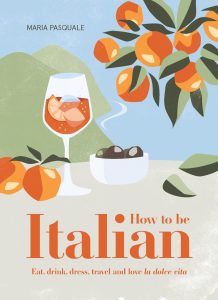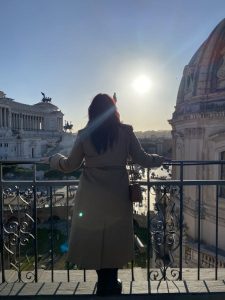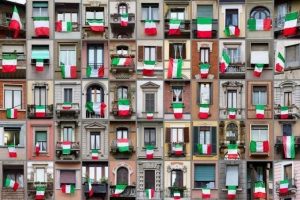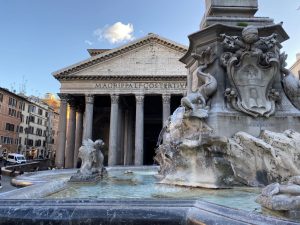Some of you know that my background lies not in writing, food or travel as this blog would suggest, but in political science, history and policy development.
My ‘nerdy side’ – as I like to refer to it – comes out every now and then and I was about as excited as I get when trying a new gelato when I saw the advertisement for the American Academy in Rome’s (AAR) lecture: Conversations that Matter: Italy Today – Politics, Culture and the Economy.
The AAR is an overseas research and study centre offering independent study and advanced research grants and fellowships in the arts and humanities (FYI the Australian and overall Commonwealth equivalent is the British Academy in Rome).
The AAR is committed to fostering cultural exchange and dialogue and host an ongoing series of events. I’m glad I didn’t miss this one.
It was a rainy evening in Rome this night but that didn’t deter a capacity crowd gathering at Villa Aurelia (which is a 17th century palazzo, once belonging to a Pope in a privileged location in Gianicolo and offering spectacular view of all of Rome) for a robust discussion on the current state of affairs in Italy and its future.
AAR Director Christopher Celenza (FAAR ’94) opened the discussion and set the tone for the evening, acknowledging that Italy is currently in a period of (apparent) great change. “What does it meant to be an Italian citizen in these times of change?” he posed. “How does Italy see itself in relation to Europe and the world?”
Moderating the discussion he then handed over to the four speakers: Sylvia Poggioli, Senior European Correspondent for the National Public Radio (NPR); David I. Kertzer, RAAR ’00, Professor of Social Sciences at Brown University; Miguel Gotor, Professor of Modern History at the University of Turin and editorialist for La Repubblica Italian newspaper; and Rachel Donadio, Rome Bureau Chief of The New York Times.
Each speaker was allocated 10 minutes to speak about what, in their opinion, are Italy’s most pressing political, cultural and economic challenges. The overarching topics covered included immigration, church and state, civics, culture and identity and corruption. Outlined below in brief are some highlight quotes and the key points covered by each speaker:
Sylvia Poggioli, National Public Radio
“Completely lacking in irony… I can hardly recognize [Woody] Allen’s Rome. His characters are having a carefree romp, but Italians aren’t – they’re experiencing a long, drawn-out crisis. [And]… under the warm Roman sun, there’s still a lot of ambiguity and violent tragedy.”
Learnings:
- Incidents like the terrorist bombing of a bank in Milan’s Piazza Fontana in 1969 (claimed 17 lives and injured more) have inspired decades of politically motivated violence and retaliation between left and right, involved government and military collusion and coverup, and resulted in consistent judicial inaction.
- It would seem Italy has a ‘collective amnesia’ and inability to address its past. Hence, no one was ever imprisoned for the initial or subsequent acts – despite numerous trials.
- Italy is unable to ‘cleanse itself’ because of lack of public engagement in society and civics – perhaps attributed to a Machiavellian anti-institution attitude. This weakness in civic society is also evidenced by the lack of good investigative and critical journalism – again, this concept of collective amnesia.
David Kertzer, Brown University
“Formerly, immigration meant Southern Italians relocating north for economic reasons. Now it’s something quite different. In the 1990s Italy had the lowest fertility rate in the world. Without the subsequent influx of South Asians and Africans it would have remained that way.”
Learnings:
- A recent poll indicated that only 10% of Italians have any faith in today’s political parties (this is in marked contrast to what he experienced in Bologna as a student in the 1970s where the Communist centric populace was extremely politically active)
- The level of disengagement in civics and politics is rife. There is a total disillusionment among Italians – attributed to a warranted level of distrust given historical events but this could also be seen as an impasse to see or avoid where things are headed.
- Immigration continues to present problems with Italy, with the country not being prepared for the influx. Issues of identity are uniform across the country and for example the offspring of a Chinese-born person in Bologna are not regarded as Italian (let alone Bolognese). This applies to intra-migration also, with respect to Italian born people who move between north and south Italy and how they are identified in their place of settlement – ie a person of Sardinian descent in Bologna will never be identfied as Bolognese.
Miguel Gotor, University of Turin and La Repubblica
“Corruption hinders economic development, prevents competition, weakens confidence in the economic institutions and is the main impediment to foreign investment in Italy. But [in Italy] no one ends up in jail for corruption-related offenses.”
Learnings:
- Corruption is probably the single most influencing factor in the dysfunctional state of Italian governance and the economy. It costs Italian citizens approximately 60 billion euros annually.
- The rate of corruption in Italy is nearly twice the European average (17% v. 9%).
- In 1996 there were 1,700 convictions for corruption while in 2006 there were only 239.
- The cultural stereotype that “everybody steals in Italy” persists largely because Italians believe that while they themselves are not corrupt everyone else is, so a little corruption is needed to get things done. The stereotype is of course false but affirms the concept and gives theft and corruption oxygen.
Rachel Donadio, New York Times
“I often ask myself: Where’s the breaking point? Is taking to the streets even considered an option among young Italians who have grown up watching TV? Will internet-based collective action work in Italy like it did during the Arab Spring? We’re at a moment when the political parties don’t align with people’s interests. This is what’s perplexing about Italy – it’s beautiful and dark; nothing works and yet everything works. Is Italy in the forefront of decline or does it offer lessons in survival?”
Learnings:
- Because of deep cultural and economic conservatism in Italy, there is a significant divide between younger and older workers. Church hierarchy and Italian tax system serves to protect those on the inside from those on the outside.
- A sad proportion of young Italians are in their 30s hold degrees and are either unemployed or working outside their field of specialty.
- It seems that young Italians or Italians in general are unable or just refuse to mobilise in demand for change. Just when you think things cannot possibly continue as they are (with respect to opportunity, labour market and remuneration), they just do!
- It’s hard to follow Italian news or politics. We’ve gone from Berlusconi and Bunga Bunga to Monti and the current topic of proposed labour reforms (often referred to as the third arm of Italian politics). It’s a real challenge for journalists to conceptualise and present the news because of this.
One sense that was consistent throughout the overall discussion was frustration. Italy is a country of contrasts and irony. The uniform frustration lies in the fact that despite all of the potential and capacity Italy has – think about excellence in industry, agriculture, fashion, tourism, food and it’s an economy that should be thriving – it seems just unable to ‘get it together’. To unite, make change and move forward.
The discussion was a sombre one which provided no real answers.
Cleary there is a long way to go in order to achieve growth and prosperity. Historically, however, Italy has resisted countless other challenges and won many battles, so I believe it is attainable – I just hope it’s in my lifetime.
A highlights clip of the lecture is below (courtesy of the AAR website: www.aarrome.org) (oh and I’m the person in the back left of the crowd with the long hair, frenetically taking notes in order to share them with you here! 🙂 ).
Signing off from Roma,
Baci Maria







